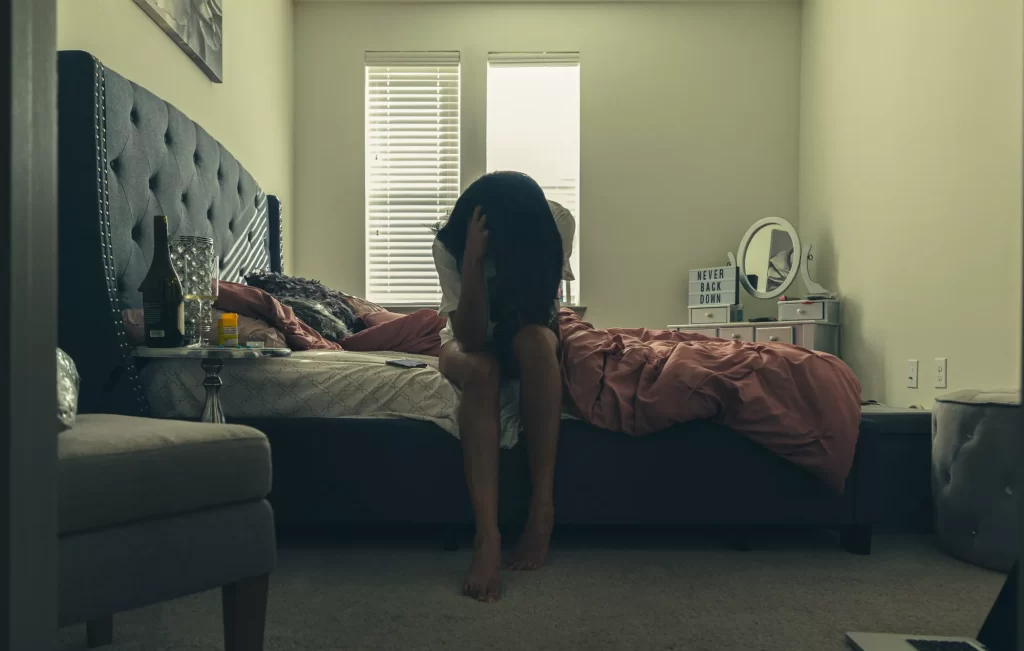Anxiety at night is a common experience that many of us face. Having anxious thoughts at night can make falling asleep difficult and leave you feeling tired and groggy throughout the day. When you’re left alone with your thoughts at night, it can become easy for a minor worry to end up causing a spiral of other thoughts to flood in. Luckily, there are ways you can reduce nighttime anxiety and get a better night’s rest.
Practice Good Sleep Hygiene
Practicing good sleep hygiene is important for easing you into sleep more easily and can also assist with curbing those feelings of anxiety around bedtime. But what is sleep hygiene? Sleep hygiene refers to a set of habits you can make for yourself to get better quality of sleep. Some good sleep hygiene habits include:
- Creating a bedtime routine and sticking to it each night;
- Limiting screen time before bed;
- Avoid major exercise and large meals before bed;
- No caffeine or alcohol near bedtime;
- Keep your bedroom dark and cool.
Sleep hygiene habits can be difficult to implement at first, but sticking to them can assist in lowering stress around bedtime and reducing anxiety symptoms. These small changes can help you achieve a better quality of sleep, potentially curbing daytime anxiousness. Here are some tips for putting good sleep hygiene habits into practice.
Avoid Stressful Activities Before Bed
Nighttime anxiety is caused by things that happen during our day-to-day lives. When you lie down to sleep, you’re often left alone with your thoughts, which can cause your brain to spiral through whatever is stressing you out from the day and trying to find solutions. You can stimulate your brain to relax at night by avoiding stressful activities before bed, assisting your brain with turning off unwanted thoughts, and allowing you to get those precious hours of sleep.
In the hours leading up to bedtime, try to put down any work or school assignments and choose to focus on something that relaxes you instead. Maybe this is reading a book, working on a craft project, taking care of a few easy chores before bed, or something else entirely. Whatever you choose, make sure it is an activity that won’t raise your stress levels. Your best bet is to save the stressful activities for the morning when you have more energy.
Limit Screen Time
Chances are you have probably already heard that limiting screen time can achieve better sleep, and for a good reason. Limiting screen time at night has two major advantages. First, watching videos, scrolling through social media, and checking emails can raise your stress levels and end up increasing nighttime anxiety. Second, the blue light from your screens mimics sunlight, tricking your brain into thinking it’s still daytime and suppressing your natural nighttime levels of melatonin. Melatonin is a hormone that helps you in falling asleep. Setting aside your devices or using a blue light filter to reduce the amount that hits your eyes can help your body produce more melatonin, making your body relax.
Unwind With a Relaxing Night-Time Routine
Allowing your mind to slowly relax before bedtime can make it easier to fall asleep, reducing anxious thoughts. In order to do this, it’s important to create a relaxing nighttime routine to train your brain that it’s time to sleep. It’s important to remember that creating a nighttime routine will take a few days or even weeks before you start to see positive outcomes.
Creating a nighttime routine is a personal experience that will vary depending on your needs. The goal when designing your bedtime routine is to make a routine you can stick to every night that relaxes your mind and body. Some ideas for things for your nighttime routine include:
- Journaling;
- Taking a warm bath or shower;
- Stretching or yoga;
- Meditation and slow breathing;
- Doing a calming activity like reading.
Consider Alternative Treatment Options
There may be times when your nighttime anxiety is so severe that you may find it difficult to manage on your own, even with the tips listed above. If that is the case, you may need assistance from a licensed therapist to help you manage your symptoms. A therapist can help you talk through stressful situations in your life that may be contributing to your anxiety. They can also assist you with managing stressful thoughts on your own using cognitive behavioral therapy (CBT).
In addition to the techniques mentioned and talking with a therapist, those with severe anxiety may want to seek other treatments. These alternative methods can include ketamine treatments, which have been shown to potentially reduce symptoms of anxiety, depression, PTSD, and continuous discomfort.
Ketamine Treatment for Anxiety Symptoms
Ketamine is an FDA-approved medication that has been safely used for decades, and it is now emerging as a highly efficient treatment for a diverse range of challenging conditions. One of the more recent uses for ketamine has been for treating sadness that cannot be managed through traditional medication. Ketamine has also been used for those suffering from anxiety disorders, including generalized anxiety and social anxiety disorders.
Klarisana provides IM ketamine therapy (Ketamine for Non-Anesthetic Indications (KNAI) at our centers in Texas and Colorado. Our expert team creates tailored therapy plans that combine intramuscular ketamine therapy with psychotherapy and other treatments to assist you in rediscovering the full life you may have thought forever lost.
If you’re ready to see if ketamine treatments are right for you, contact us today to book an appointment with our team of providers and get the aid you need for a restful night’s sleep.





